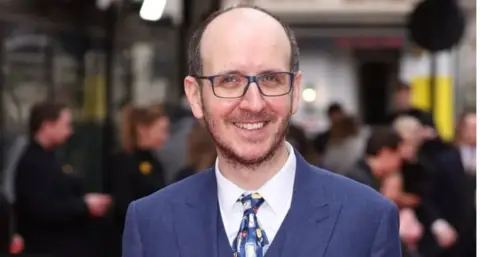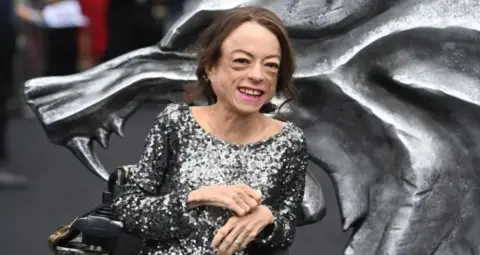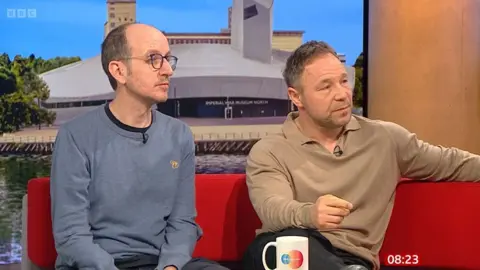Adolescence writer says benefit cuts 'punching down' on disabled people
 Getty Images
Getty ImagesThe screenwriter behind hit TV drama Adolescence has told the BBC the government's planned benefit changes are "punching down" on disabled people.
Jack Thorne, who is autistic and won critical acclaim for the Netflix drama, said the plans were "wrong and dangerous and that we need to be challenging them as a society".
The government announced plans in March to make £5bn welfare cuts amid increasing demand and to encourage people back into work.
The Department for Work and Pensions (DWP) said: "We are determined to support people in all parts of the country by tackling poverty and creating secure, well-paid jobs."
Thorne told the BBC's Access All podcast that the plans were going to cause "severe hardship" for thousands of disabled people and "enough is enough".
He said: "It is very expensive being a disabled person. And the extra payments are required for people to have any quality of life."
According to the charity Scope, disabled households face an average of £1,010 extra costs per month.
"I'm aware of friends of mine that are really struggling right now, and it makes me incredibly angry that talented, brilliant people are being denied the support that they need in order to lead a reasonable quality of life," Thorne said.
"I don't understand why I live in a country now where we punch down quite as much as we do and it worries me about the future direction of travel."
Changes to benefits include freezing the "health element" of Universal Credit for existing claimants at £97 per week and reducing the amount for new claimants to £50 from 2026.
Parliament is also set to vote on plans to tighten eligibility criteria for Personal Independence Payments (Pip), which is used to cover the additional costs of being disabled, whether you work or not.
 Getty Images
Getty ImagesThorne was one of more than 100 influential disabled people to sign an open letter to Prime Minister Keir Starmer, which said of the cuts: "This is not reform; it is cruelty by policy."
The letter, published as part of the new #TakeThePIP campaign, was signed by actors Liz Carr and Doctor Who star Ruth Madeley, as well as comedians Rosie Jones and 2018's Britain's Got Talent winner Lee Ridley, otherwise known as Lost Voice Guy.
They say the changes to the way Pip will be awarded is a "radical departure from the current system".
Currently those receiving the benefit must score 12 points across various activities in the assessment, but from 2026 four of the 12 points must come from one single activity for the applicant to receive the highest rate.
The signatories said these changes mean those who "can't wash below the waist, for example, could now not qualify and lose vital benefits",
"For us, Pip is not a benefit - it is access to life. Without it, people are left housebound and isolated."
Thorne, who has written dramas including His Dark Materials, Toxic Town and the stage play Harry Potter and the Cursed Child said: "They're [the government] worried about all these different things, but the answer to that is not [to target] the people who are suffering the most.
"Talented, brilliant people are being denied the support that they need in order to lead a reasonable quality of life."
Thorne was diagnosed autistic as an adult and lived with an intense skin condition called cholinergic urticaria in his 20s, meaning he was allergic to heat and his own body movements. He spent six months in bed "because every time I moved, I was having an allergic reaction".
He says he has been passionate about supporting and representing the disabled community ever since.
"They [the government] just got this one so wrong, and I don't think it's been done with enough consultation with the disabled community. And I think if they did consult meaningfully, they would discover what they need to do here. And it's not this."
A consultation on some of the planned changes to benefits is available to fill in online until 30 June.
The DWP added: "Pip is a part of the way that we support disabled people and people with long term health conditions.
"But with the number of people claiming Pip doubling since the pandemic, it's right that we rebalance the system to ensure support is targeted to those who need it most.
"Alongside this, as part of our Plan for Change, we've increased the 'national living wage', uprated benefits, and are helping over one million households by introducing a fair repayment rate on Universal Credit deductions."

Thorne received critical acclaim earlier this year for his Netflix drama Adolescence, which he co-wrote with actor Stephen Graham and told the story of a 13-year-old boy accused of murdering a girl in his class.
The show sparked national debates about the impact of social media and "manosphere" influencers, particularly on boys, and led to a meeting with the prime minister to talk about protecting people online.
"It's been amazing, Adolescence having the impact it has had. We're still all reeling from it."
He said since the meeting the Women and Equalities Select Committee had started an investigation into the manosphere and a group of Labour MPs are "pushing very hard" for legislative changes to protect people using the internet.
Thorne says Starmer was "very sincere and he was very interested in Adolescence and I'm really grateful for that".
"And I think he needs to be as interested in this," he added.
